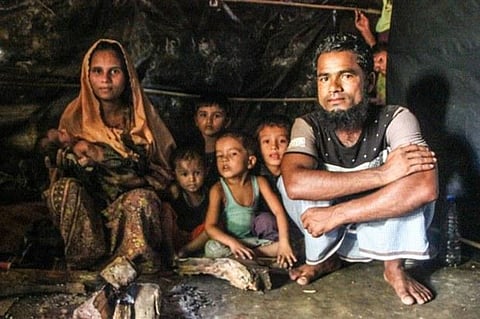
- HOME
- OPINION
- ON GROUND
- INTERVIEW
- INDIA
- NewsGram USA
- WORLD
- न्यूजग्राम
- POLITICS
- ENTERTAINMENT
- CULTURE
- LIFESTYLE
- ECONOMY
- SPORTS
- Jobs / Internships
- Misc.
- NewsGram Exclusive

Bangladesh, November 14: As Bangladesh's government struggled this week to persuade residents of overcrowded refugee camps to use contraceptives as part of a new push to promote family planning among Rohingya Muslims, Nurul Islam's wife gave birth to their fifth child.
Three-day-old Ayesha was born Tuesday in a tiny, one-room hut in Teknaf upazila (sub-district) in Cox's Bazar district that her parents and four brothers have called home for the past two months since they fled a fresh cycle of violence and atrocities allegedly committed against the Rohingya minority by the military in neighboring Myanmar.
Islam was elated at what he described as his "latest achievement."
"Having a child shows that you are a strong man. I now have five of them," the 32-year-old told BenarNews proudly. "And I will try for more," he added with an air of confidence.
Unlike most other members of his community, Islam said, he was aware of birth control procedures but wasn't interested because the practice was "considered a sin."
"I know what a condom is… but have never used one," he said – a telling statement uttered by a majority of Rohingya that prompted the family planning office of Cox's Bazar to introduce birth control steps in about 15 refugee camps sheltering nearly 1 million members of the displaced group.
More than 600,000 of them, including about 20,000 pregnant women, have arrived in southeastern Bangladesh from Buddhist-majority Myanmar since its military launched a counter-offensive in response to insurgent attacks in Rakhine state on Aug. 25, according to the latest estimates from the United Nations.
Rohingya Refugee Camps set up by Bangladesh Government. Wikimedia.
'Deep-rooted problem'
Officials with the Directorate of Family Planning, which is connected to the Ministry of Health and Family Welfare, launched the birth control program in Rohingya camps in September.
But soon after, they realized they were "only scratching the surface of a deep-rooted problem," Pintu Kanti Bhattacharjee, the department's deputy director, told BenarNews.
"A majority of Rohingya, who are largely uneducated, are not aware of birth control measures. The ones who are aware are convinced that family planning methods conflict with their faith," he said, adding, "We then realized we were faced with a huge challenge."
Before the refugee crisis exploded in late August, Bhattacharjee's department had about 50 workers.
"We have hired about 200 people over the past few weeks and still feel the need for more staff," he said. The near 250 health workers operate out of 13 offices in Ukhia and Teknaf sub-districts and "go door-to-door to educate Rohingya about the benefits of family planning."
"So far, we have managed to talk about birth control with 150,000 Rohingya. We convinced 7,500 of them to take contraceptive measures like condoms, pills and injections," Bhattacharjee said.
'I would like to opt for birth control'
Islam, the refugee who became a father for the fifth time this week, was among the unconvinced multitude.
"Our children are Allah's gift to us. We will accept as many as he gives us," he said, as he prepared to walk 1 km (0.6 mile) to the nearest food distribution center to bring his family something to eat.
"Allah will take care of them," he added, before disappearing into the crowd of refugees rushing to get ration supplies.
Islam's wife, Amina Khatun, 24, said she did not agree with her husband.
"If they [family planning workers] come here, I would like to opt for birth control," she told BenarNews.
She had their first child when she was 16 years old, two years after getting married. Over the next eight years she delivered four more children. All of them, including the latest addition to their family, were born at home with help from women in the neighborhood.
"It's not easy to take care of so many children. And my husband wants to have more," Khatun said exhaustedly as she breastfed her newborn.
Abdul Muktalif, 57, a camp leader in Teknaf, said that all Rohingya couples had "at least five children in hopes that the more kids they have, the more money they will bring in when they grow up."
Muktalif, who has been living at the Leda camp for the last 14 years, has 15 children – the youngest 1 year old – from three wives.
Officials weigh voluntary sterilization
Bhattacharjee said his office was mulling the idea of providing voluntary sterilization to Rohingya but "cannot implement it unless the Ministry (of Health and Family Welfare) approves it."
In a statement issued Thursday, the United Nations Population Fund (UNFPA) said: "Simply offering sterilization would be a narrow and unethical approach.
"Family planning is a matter of individual choice, should be completely voluntary, and women, girls and couples should have access to the widest method mix for them to choose from complemented by adequate information and counseling on available methods and services," it said. (Benar)
